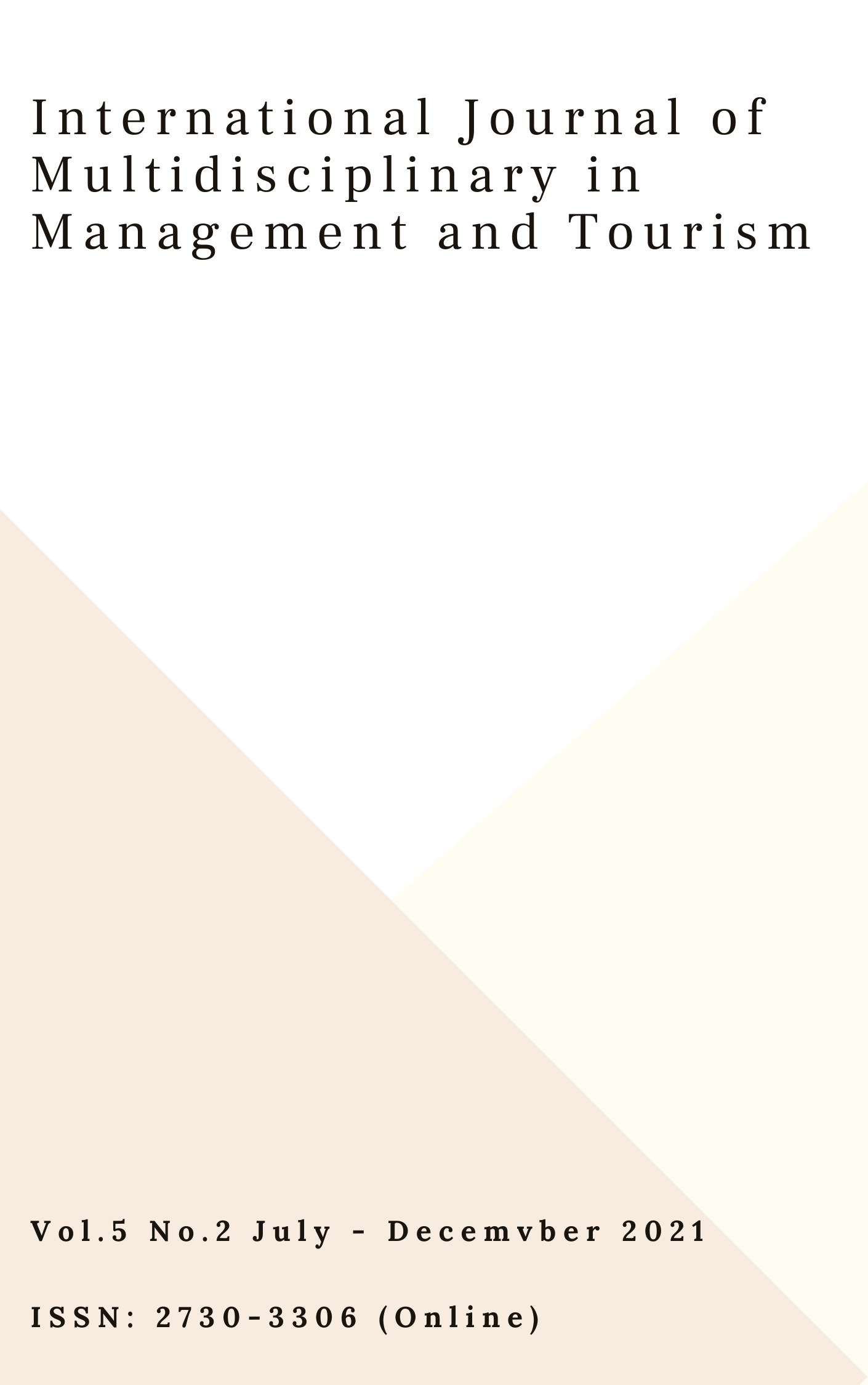Post-COVID 19 Tourism Recovery and Resilience: Thailand Context
Main Article Content
Abstract
COVID 19 is a pandemic that has great impacts on tourism businesses. All countries are relying on vaccination to create herd immunity, so that they can open their doors to welcome international tourists. It is important to build confidence in health and hygiene in order to create tourism demands after COVID 19. The use of social media is another necessary strategy to communicate stories of attractions and tourism resources of a destination. Other than marketing strategies to operate tourism businesses, the “new normality”, strategies on safety protocols and sanitary measures are also important factors that every business in the tourism industry must regard them mandatory. The government must implement and communicate adequate health and safety protocols at all points of the travel journey. To fully reopen doors to international arrivals and travelers could travel freely with less fears of contracting COVID 19, worldwide immunization programs must have been completed to make sure that there is a herd immunity in place. Tourism recovery and resilience must be carried out along with confidence through health safety and security measures. Principles of community-based tourism and sustainable tourism must be observed. Travel recovery and resilience must enhance livelihoods and economies with responsibility and sense of solidarity. The government must provide economic packages to entrepreneurs for tourism recovery and resilience.
Article Details

This work is licensed under a Creative Commons Attribution-NonCommercial-NoDerivatives 4.0 International License.
References
Aref, M. (2020). How COVID-19 impacted travel & tourism industry globally. https://infomineo.com/covid-19-impacted-travel-tourism-industry/
Barbados, M. (2017). Tourism industry reform strategies for enhanced economic impact Caribbean development bank. https://www.caribank.org/publications-and-resources/resource-library/thematic-papers/tourism-industry-reform-strategies-enhanced-economic-impact.
Barney, J. (1991). Firm Resources and Sustained Competitive Advantage. Journal of Management, 17, 99-120. http://dx.doi.org/10.1177/014920639101700108
Chanklap, B. (2021). Approaches to Morning Glory Supply Chain Management of Tung Yee Peng Community, Ko Lanta District, Krabi Province. International Journal of Multidisciplinary in Management and Tourism, 5(1), 9-18.
International Labor Organization. (April, 24 2020). COVID-19 and employment in the tourism sector: impact and response in Asia and the Pacific. https://www.ilo.org/ wcmsp5/groups/public/---asia/---ro-bangkok/documents/briefingnote/wcms_ 742664.pdf
Kotchare, T., Pathumporn, J., & Esichaikul, R. (2021). A Study of Destination Image Factors and Destination Choices the Foreign Gay Tourists’ Loyalty to Tourism Destination in Thailand. Journal of Multidisciplinary in Humanities and Social Sciences, 4(2), 727-743.
Lunkam, P. (2021). Tourism & Hotel industry in the post-COVID world. https://www.krungsri.com/en/research/research-intelligence/ri-future-of-tourism-21
Mahumapelo, S. (2020). Tourism business council SA response to COVID-19 risk adjusted strategy. tourism 09 June 2020 chairperson. https://pmg.org.za/committee-meeting/30418/
Pankham, S., & Plaibou, N. (2021). The Influence of Causal Factors Positive Electronic Word of Mouth on Facebook Fanpage about Cultural Attractions of Thai Tourists. Journal of Multidisciplinary in Humanities and Social Sciences, 4(3), 842-856.
Pankham, S., & Yutthananiyom, S. (2021). The Influence of Causal Factors of Revisit Intention On Travel Facebook Page of Thai Travelers. Journal of Arts Management, 5(1), 232-246.
Peter, V. (2019). Measuring economic well-being and sustainability: a practical agenda for the present and the future. https://ec.europa.eu/eurostat/cros/system/files/euronaissue 1-2019-article 1_0.pdf
Philip, K., Kartajaya, H., & Setiawan, I. (2020). Marketing 5.0: Technology for humanity: Technology for humanity. https://www.amazon.com/Marketing-5-0-Philip-Kotler/dp/1119668514
Pinchuck, J. (2020). IT is unclear what the tourism industry would look like after COVID-19: Published 12 months ago on July 11, 2020 https://www.thailand-business-news.com/tourism/79048-how-covid-19-will-change-the-thailand-tourism-sector.html.
Pinyocheep, P., Kumboon, B., Sajjanand, S., & Kositkanin, C. (2021). Models of integrating supply chains on quality service and results operations of the hotel business in Thailand. Journal of Arts Management, 5(1), 218-231.
Richards, G., & Wikson, J. (2004). Developing creativity in tourist experiences: A solution to the serial reproduction of culture?. Tourism Management, 27(6), 1209-1223. https://doi.org/10.1016/j.tourman.2005.06.002
Sirilamduan, C., Chuaychuny, S., Ruamboon , K., & Srisuk, S. (2021). A Development Web Application for Planning Cultivate Vegetable to Maximize Profits on Nam Kam District, That Phanom, Nakhon Phanom Province, Thailand. International Journal of Multidisciplinary in Management and Tourism, 5(1), 19-28.
Songsraboon, R., Thongtao, J, Damnoen, P. S., & Huanjit, P. S. (2021). Course management based on outcome-based education (OBE) of learning by working in real conditions. Turkish Journal of Physiotherapy and Rehabilitation, 32(3), 20491 – 20499.
Stacey, J. (2019). Rebuilding tourism for the future: COVID-19 policy responses and recovery. https://www.oecd.org/coronavirus/policy-responses/rebuilding-tourism-for-the-future-covid-19-policy-responses-and-recovery-bced9859/.
Sungmala, N., & Verawat, A. (2021). The Impact of Socio-Demographic Factors on Employee Engagement at Multinational Companies in Thailand. Journal of Multidisciplinary in Humanities and Social Sciences, 4(2), 694-711.
Tan C.C., Damnoen P.S., Toprayoon Y., Dabjan N., Damkam K. (2022). An Exploratory Study of the Spirituality-Oriented Experiences of Tourists. In: Srivastava P., Thakur S.S., Oros G.I., AlJarrah A.A., Laohakosol V. (eds) Mathematical, Computational Intelligence and Engineering Approaches for Tourism, Agriculture and Healthcare. Lecture Notes in Networks and Systems, 214, 307-314. https://doi.org/10.1007/978-981-16-3807-7_25
UNCTAD. (2020). Impact of the Coronavirus outbreak on global FDI. https://unctad.org/en/PublicationsLibrary/diaeinf2020d2_en.pdf?user=1653.
United Nations Educational, Scientific and Cultural Organization. (2020). Museums around the world in the face of COVID-19. https://unesdoc.unesco.org/ark:/48223/ pf0000373530
United Nations. (2020). Policy brief: COVID-19 and transforming tourism. https://unsdg.un.org/resources/policy-brief-covid-19-and-transforming-tourism.
UNWTO. (2020). COVID-19 brings international tourism to a standstill in April. World Tourism Barometer, 18(3), 1-32. https://doi.org/10.18111/wtobarometereng

